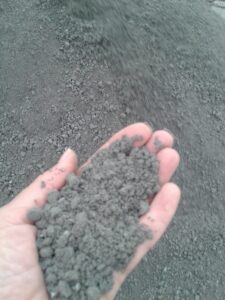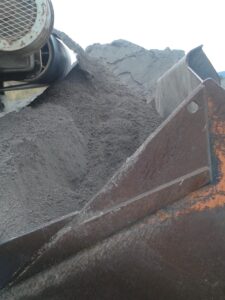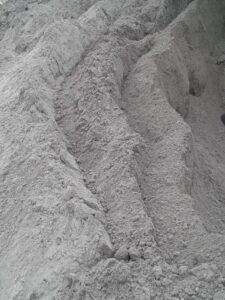GYPSUM
Agricultural Gypsum is one of those rare materials that performs in all three categories- as an amendment, a conditioner, and a fertilizer. Gypsum is calcium, sulfur and oxygen- forming a bonded molecule known as calcium sulfate (CaSO42H2O).
As an amendment, gypsum improves soil aggregation (grouping/clumping of soil particles) and permeability (ability of water, fertilizer, etc to move within the soil). It reduces surface crusting and capping so rain, irrigation and fertilizers can move into and through the soil, and also so seeds can more easily emerge.
As a conditioner, gypsum can improve compacted soils, and help prepare soil for no-till management. Poor soil structure will limit crop yields, and if high in salt, breaking up highly dense particulate will allow salts to move out of the growing layer. Gypsum is highly effective in remediating sodic soils.
As a fertilizer, gypsum equips plants to absorb nutrients by providing free calcium and free sulfur. When released, both elements act like tiny magnets (calcium has a positive charge, sulfur has a negative charge) – grasping minerals from the soil and making them available to the plants. Emerging seedlings and young plants will take in and hold more calcium at this stage than more mature plants. Adequate calcium is especially important in the early growth period. (Albrecht, 1989) For more discussion on calcium, see the High Calcium Limestone section here.
Water- whether from sky or pipe, too little or too much- impacts all crops. Maximizing your water performance is crucial. Gypsum improves water efficiency in several ways. Water storage can be 25% to 100% better in gypsum treated soils as opposed to non-treated soils. Infiltration rates are improved- allowing water to move down and up through your soil- improving the hydraulic conductivity.
The other component of gypsum- sulfur- has been called “The Forgotten Element”. Many older fertilizers contained sulfur. In fact, back in the day, air pollution even contributed sulfur to the soil. However, modern day nitrogen and nitrate-based fertilizers no longer provide this element, so it’s needed now more than ever. Sulfur in gypsum is sulfate- which is the easiest form of sulfur for plants to absorb.
When using N based fertilizers, inadequate sulfur can lead to nitrate overloads. Sulfur is part of a nitrate-metabolizing enzyme so it helps limit nitrate buildup in soil and plants.
Adequate sulfur in your soil may be more important than the proper ratio of NPK. In fact, plants need to take up almost equal amounts of sulfur and phosphorus. Alfalfa can take up 46 lbs of sulfur from the soil, 60 bushels of soybeans can take up 12 lbs, and 150 bushels of corn 10 lbs of sulfur- even more will be present in silage (Zimmer, 2017). Sulfur is required for root growth, to produce chlorophyll, and nitrogen-fixing root nodules in legumes, and helps crops like canola and sunflowers produce more oil. It is required to make complete proteins.
An adequate ratio of carbon to nitrogen to sulfur is 100:8:1. Without this proper ratio, stover (plant residues) will not convert to humus, but will either rot (producing formaldehyde and alcohols) or will remain inert on the soil surface. Without following with manures and/or cover cropping, removing plant material at harvest further reduces available sulfur. So again, most soils are in need.
OSA Gypsum is raw, crushed and screened. It is sourced from the west coast region and has previously been certified for use in organic agriculture by WSDA as product #1568. (The current certification is expired, and has not been renewed at this time.) An assay is available. Gypsum is priced by the ton and available delivered or picked up at our scale yard location in Arden, WA. (A non-organic gypsum product- sourced from the wallboard industry- is also available with advance notice.) Delivery charges apply.
Want to learn more about soil?
Soil is the basic building block of life. Learn about what to look for in your soil today!
OSA Products
Take a look at our products today!
OSA Services
In need of soil service? We offer spreading, blending, and testing.
Interested in learning more?
Browse our list of references in our Soil Library




